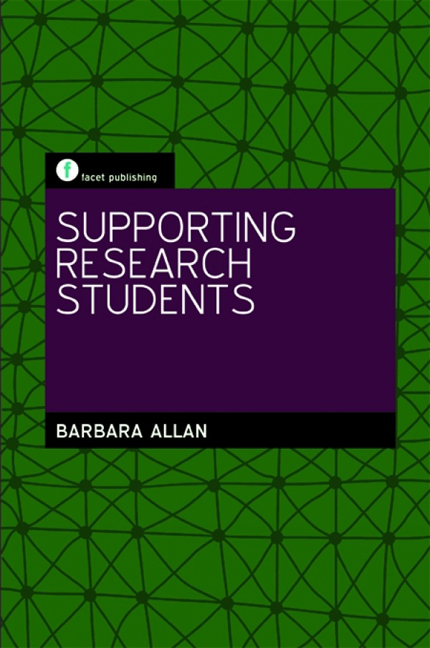Book contents
- Frontmatter
- Contents
- List of figures
- List of tables
- Acknowledgements
- 1 Introduction
- 2 Research and the research process
- 3 The research student's experience
- 4 Moving forward and completing the research
- 5 Research skills training
- 6 Supporting research students in academic libraries and information services
- 7 Virtual graduate schools
- 8 Introduction to research communities
- 9 Professional development
- Conclusion
- References and bibliography
- Index
9 - Professional development
Published online by Cambridge University Press: 09 June 2018
- Frontmatter
- Contents
- List of figures
- List of tables
- Acknowledgements
- 1 Introduction
- 2 Research and the research process
- 3 The research student's experience
- 4 Moving forward and completing the research
- 5 Research skills training
- 6 Supporting research students in academic libraries and information services
- 7 Virtual graduate schools
- 8 Introduction to research communities
- 9 Professional development
- Conclusion
- References and bibliography
- Index
Summary
Introduction
In this chapter I consider different approaches to professional development for library and information workers who are supporting research students. These include support offered by professional organizations and networks, provision offered by higher education institutions, and research degrees. The chapter ends with conclusions relating to the book as a whole.
In Chapter 1, I noted that although the library and information profession is a graduate one there are relatively few practitioners who have obtained a research degree. This means that most LIS practitioners will not have experienced and internalized the processes involved in gaining a doctorate. However, many will have experience of undertaking research activities, e.g. a dissertation as part of an undergraduate or postgraduate degree, or an investigative project as part of normal professional activities. What are the differences between an investigative workplace project and academic research of the type done by doctoral students? Some authors, e.g. Cohen, Manion and Morrison (2000), summarize the differences between academic research and investigative work-based activities, which they label ‘evaluation’. Some of these differences are outlined in Table 9.1.
However, the distinction between research and evaluation is not as clear cut as is suggested by Table 9.1 and there is overlap between the two concepts. An important distinction between the two is that research is concerned with adding to theory and contributing to academic knowledge, while evaluation is often concerned with judging the quality and impact of an activity or initiative and then using the findings to inform practice, often at a very local level. After reading the foregoing, some readers may identify that they have been involved in evaluation activities, e.g. evaluating student satisfaction with library services, measuring part-time students’ use of library and information services or exploring the impact of a new online service for distance-learning students. These types of activity provide a good basis for developing further knowledge about research and the research process.
Professional organizations and networks
A number of organizations provide access to professional development activities relevant to library and information workers who wish to support research students. In the UK these include generic professional associations such as the Chartered Institute of Library and Information Professionals (CILIP), with its specialist groups. Many other professional associations and networks exist, and the following are indicative of the types of organizations that are active in the field in the UK.
- Type
- Chapter
- Information
- Supporting Research Students , pp. 165 - 174Publisher: FacetPrint publication year: 2009



